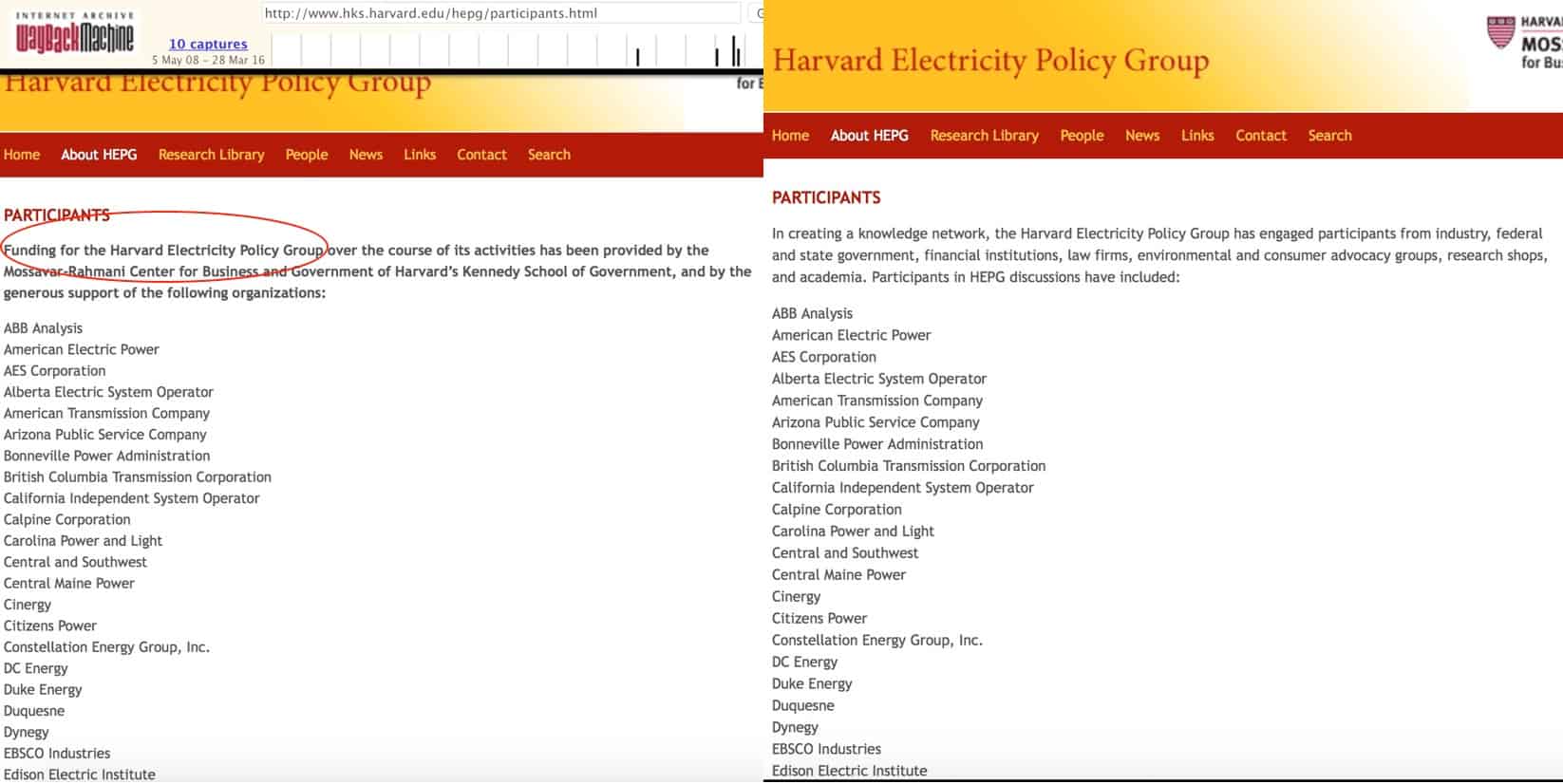Harvard Electricity Policy Group
The Harvard Electricity Policy Group (HEPG) is a utility-funded university institute that comments and provides research on the electricity sector.
Ashley Brown is the Executive Director and previously served as a Commissioner of the Public Utilities Commission of Ohio. Brown also acts as counsel to Greenberg Traurig LLP, a major international law and lobbying firm that includes clients in the unregulated and regulated utilities market. Clients include Covanta Energy (which owns trash incineration facilities) and the National Rural Electric Cooperative Association. Greenberg Traurig previously housed Jack Abramoff and the lobbying team involved in the Indian gaming scandal.
As of March 2016, HEPG stated on its website that funding has been provided by a large list of utility interests:
• American Electric Power
• AES Corporation
• Arizona Public Service Company
• Duke Energy
• Edison Electric Institute
• Enron
• Entergy Services, Inc.
• Exelon/Commonwealth Edison
• FirstEnergy Corporation
• GenOn Energy
• Georgia Transmission
• National Grid
• National Rural Electric Cooperative Association
• Northeast Utilities
• PacifiCorp
• Pacific Gas and Electric
• Sempra Energy
• San Diego Gas & Electric
• Southern California Edison
• Southern Company
• Tuscon Electric Power
• Wisconsin Electric
• Wisconsin Energy Corporation
• Xcel Energy
HEPG’s website detailing the funding from utility companies, trade associations, and law firms was recently deleted and changed to read, “Harvard Electricity Policy Group has engaged participants from industry, federal and state government, financial institutions, law firms, environmental and consumer advocacy groups, research shops, and academia. Participants in HEPG discussions have included.” See below:

None of this funding was disclosed in recent journal articles written by Brown, including in the 2014 copy of The Electricity Journal (TEJ), on whose advisory board Brown sits. David Owens of the Edison Electric Institute also sits on TEJ’s Editorial Advisory Board.
Brown also has been a member of the Board of Directors of the Entegra Power Group, which is a natural gas power plant company with approximately 3,300 MW of power generation.
Brown was previously member of Advisory Council to Board of Directors of Electric Power Research Institute, a think tank funded by the electric utility industry, and he previously was a Board Member of the Oglethorpe Power Corporation (OPC) in Tucker, Georgia. OPC is tied up with the expensive nuclear power plant, Vogtle, being constructed by Southern Company.
Brown wrote a flawed opinion piece used anti-solar rhetoric to attack the distributed solar industry. His piece was entitled “Valuation of Distributed Solar: A Qualitative View.” The piece contained little quantitative analysis behind its claims.
Echoing the arguments of investor-owned utilities, Brown holds that distributed solar leads to substantial cost shifting onto non-solar customers, but provides little data to support his opinion.
Furthermore, Brown’s testimony in Wisconsin on the topic of distributed generation provided absolutely no state-specific data to support his theory that solar owners, who make up just 4 of every 10,000 We Energies customers, are causing undue hardship on the poor.
Yet, Brown’s claims have been echoed by the Partnership for Affordable Clean Energy (PACE) and the National Black Chamber of Commerce to attack solar net metering policies.
Tyler Huebner, the executive director of RENEW Wisconsin, and Brad Klein, a senior attorney at the Environmental Law & Policy Center, examined its claims made by Wisconsin utility companies and found that the amount of fixed charges went far and beyond any impact on the utilities. Plus, a 2009 study commissioned by We Energies, an electric utility company operating in Wisconsin, found that the value of distributed solar was higher than the cost of retail electricity, which discounts Brown’s argument on the cost of solar to non-solar customers.

